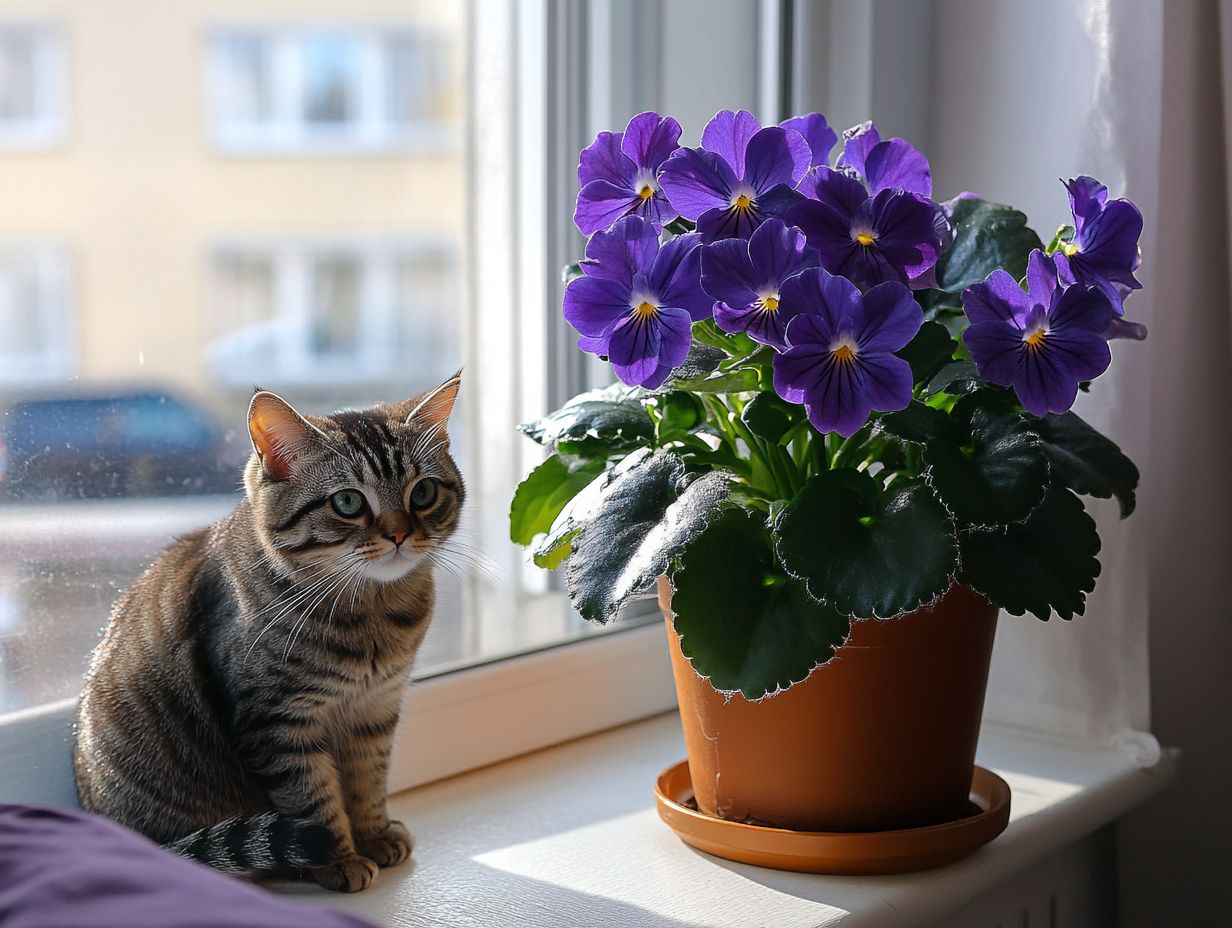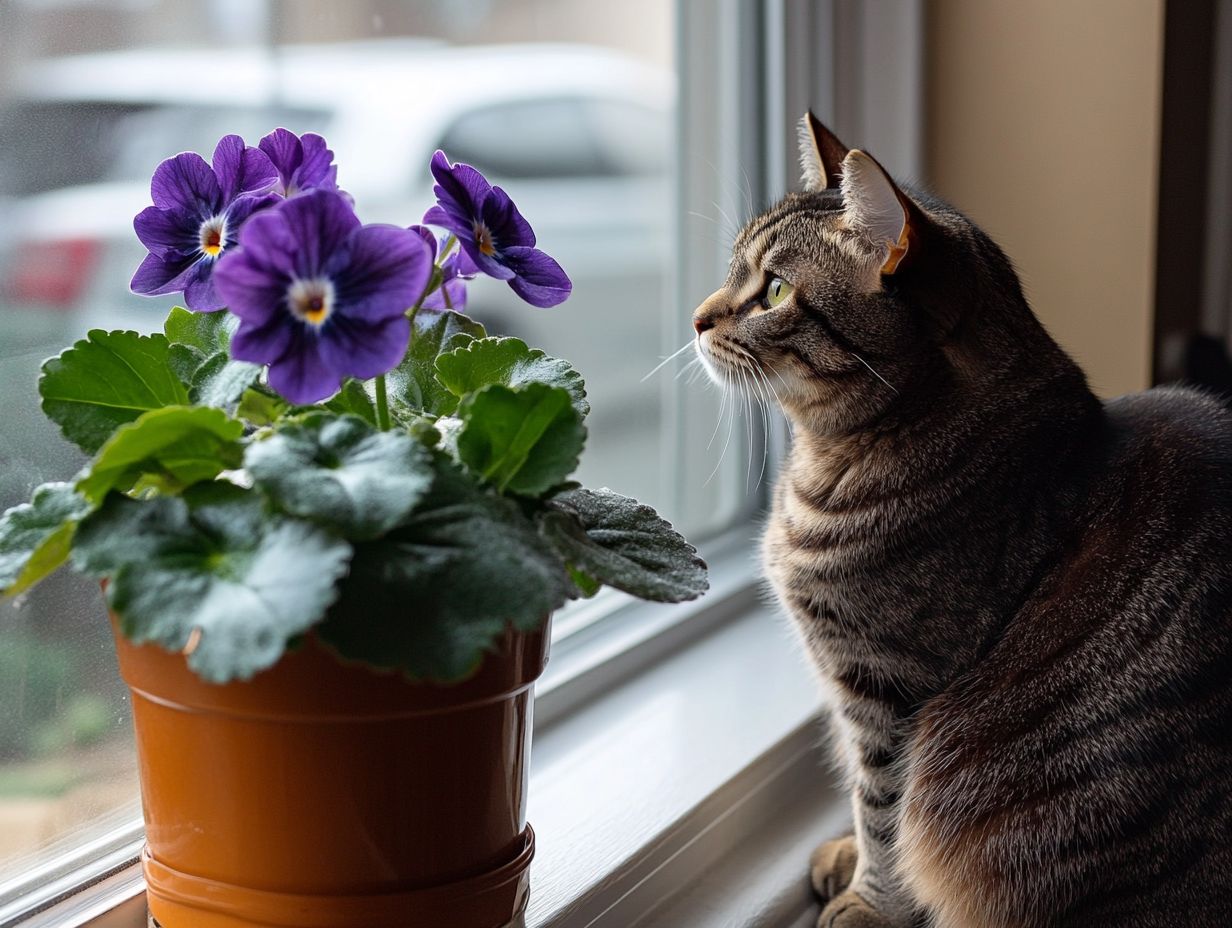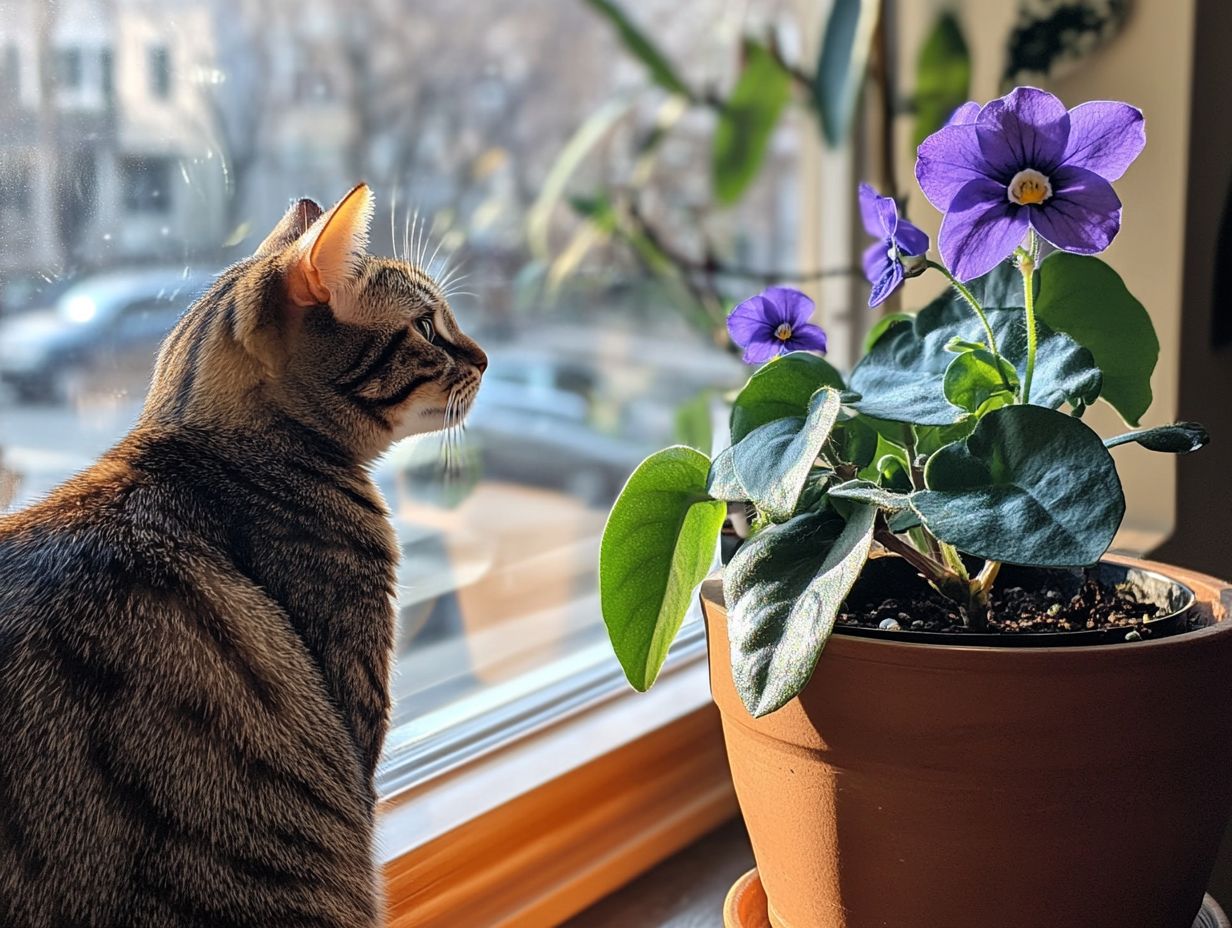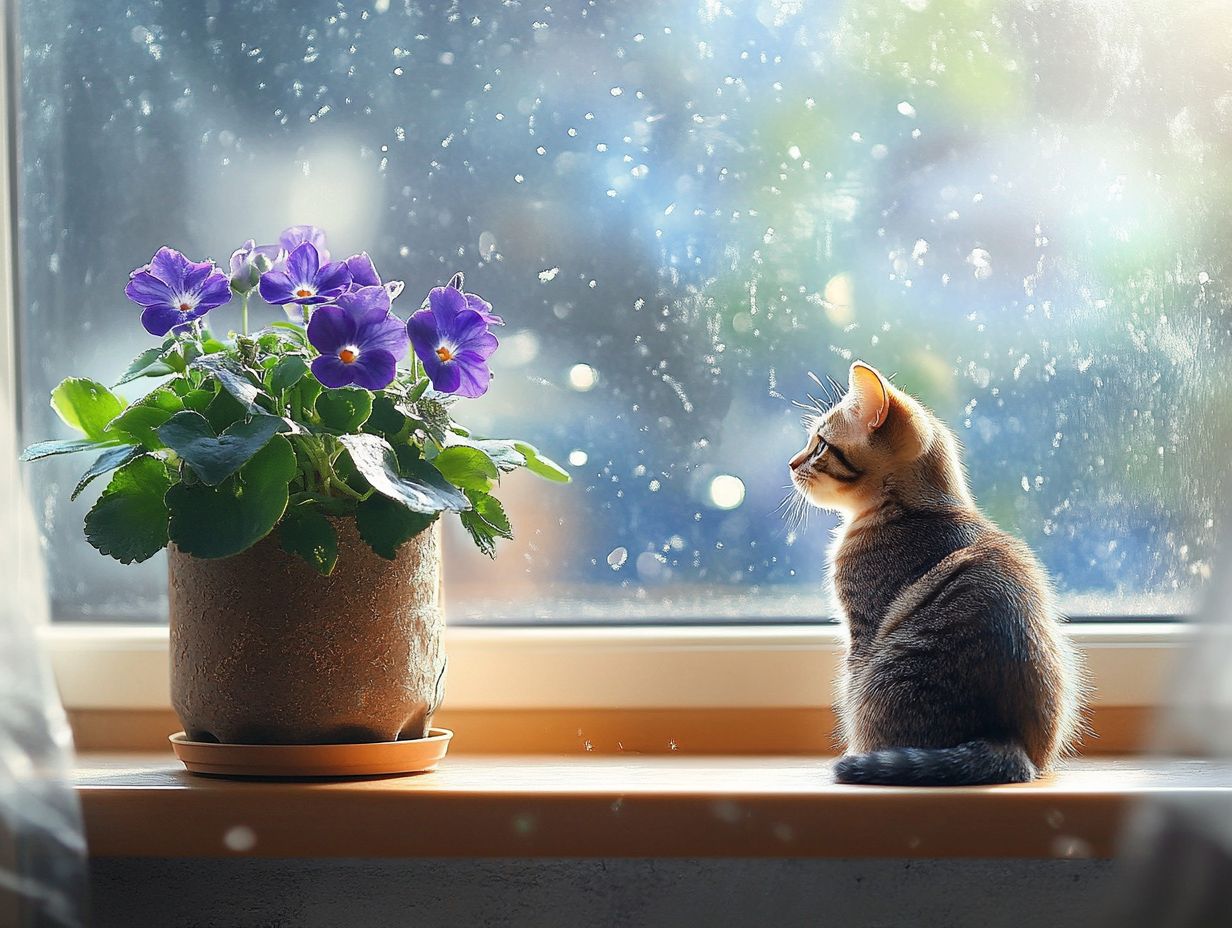If you’re a cat owner who loves houseplants, you might be wondering whether African Violets, scientifically known as Saintpaulia spp., are safe for your furry friend. According to the ASPCA’s Toxic Plants Database, African Violets are generally considered non-toxic to cats. However, some sources also mention the presence of cardiac glycosides, which can cause mild digestive upset if ingested in large quantities. Therefore, it’s crucial to monitor your cat’s interaction with these plants.
These beautiful blooms, known for their pretty flowers and soft leaves, can brighten up any space, but it’s essential to know if they pose any risks to your cat.
This article explores the parts of the African Violet plant that could be harmful, the symptoms of potential toxicity, and what to do if your pet interacts with the plant, alongside useful plant care tips.
Additionally, tips on preventing accidental ingestion and alternative plants for cat-safe greenery, such as the Boston fern and Red Edge Peperomia, are provided.
Read on to ensure your home stays safe and vibrant!
Key Takeaways:

- African violets may be a beautiful addition to your home, but caution must be taken as they can cause mild digestive upset to cats if ingested in large quantities.
- If your cat exhibits symptoms such as vomiting or diarrhea after ingesting any part of a plant, seek veterinary care and vet advice immediately.
- To prevent any potential issues, keep all plants out of reach and consider using safe alternatives like catnip or cat grass.
Are African Violets Safe for Cats?
African violets, scientifically classified as Saintpaulia spp., are beloved houseplants known for their soft leaves and beautiful flowers. They are particularly popular among pet owners looking for pet-friendly, non-toxic plants for indoor gardening.
Fortunately, African violets are generally regarded as safe for cats, which aligns with the increasing demand for pet-friendly houseplants. However, it is important to verify their non-toxic status, especially for curious cats that may be drawn to the foliage.
Understanding plant safety and toxicity is essential for creating a harmonious environment at home, especially for curious cats.
What Parts of the African Violet Plant are Toxic to Cats?
African violets are classified as non-toxic plants for cats, meaning that, typically, no parts of the African Violet plant, including leaves and flowers, are considered toxic. This quality makes them safe for households with cats and other pets, unlike toxic plants such as lilies.
In contrast to toxic plants like lilies, which can cause severe and potentially fatal harm to cats if ingested, African violets generally present no danger but should still be monitored.
It is essential for anyone living with animals to know which houseplants are safe for pets, as having pet-friendly plants can help prevent dangerous situations.
Symptoms of African Violet Poisoning in Cats

African violets are non-toxic to cats; however, responsible pet ownership entails being aware of potential symptoms of poisoning from other plants. Mild symptoms may include drooling or slight vomiting, while severe symptoms could involve persistent vomiting or lethargy.
For pet owners concerned about the safety of their plants, it’s important to know if African Violets are safe; you can read more in this guide: Are African Violets Harmful to Cats? A Detailed Guide for Pet Owners. These symptoms warrant immediate veterinary care.
What to Do If Your Cat Ingests African Violet?
Cats can safely consume African violets; however, it is important to monitor them for any unusual signs. If your cat shows symptoms of illness after eating an African violet, it is advisable to consult your veterinarian for vet advice. If your cat exhibits symptoms of poisoning, immediately remove them from the area and contact your veterinarian or a poison control hotline.
Mild symptoms may include vomiting, drooling, or lethargy. Maintaining a safe environment for your cat involves more than just knowing which plants are safe; each cat may react differently to plants, even those deemed non-toxic. While African violets are generally safe, many other plants contain toxins harmful to pets.
Regular veterinary visits can help detect any potential issues early on.
Preventing African Violet Poisoning in Cats
To keep your home safe, use tall shelves or hanging planters to keep African Violets out of reach. Ensure any potentially toxic items are securely stored.
Many pet owners mistakenly believe all houseplants pose a risk, but African Violets are a safe choice. Although African Violets are generally non-toxic, any plant material may cause mild upset stomach if consumed in large quantities. Being aware of this helps maintain a safe environment for your pets.
For immediate assistance, contact the ASPCA Animal Poison Control at (888) 426-4435.
This article was last reviewed on October 2023 and will be updated as new research becomes available.
This article is for informational purposes only and should not replace professional veterinary advice.
For more information on plants that are safe for cats, check out our articles on other non-toxic plants and toxic plants to avoid.
Are African Violets Toxic to Cats?
African violets are considered non-toxic to cats; however, ingestion in large quantities can lead to digestive issues. The plant contains cardiac glycosides, which can cause mild symptoms like vomiting and diarrhea. It’s essential to understand the correct context of their toxicity and monitor your pet’s interaction with these plants.
Symptoms of African Violet Poisoning
- Mild Symptoms: Vomiting, diarrhea
- Moderate Symptoms: Excessive drooling, loss of appetite
- Severe Symptoms: Lethargy, heart irregularities, seizures
For more information on toxicity, consult recognized databases such as the ASPCA Animal Poison Control or veterinary journals.
Preventing African violet poisoning in cats involves several measures to ensure they do not accidentally ingest the plant. While African violets are generally considered non-toxic, being proactive with deterrents like citrus peels and cayenne pepper can help keep curious cats away.
How to Keep Cats Away from African Violets?

A natural approach is to place citrus peels around the plants, as the strong scent of citrus is often disliked by cats. Sprinkling cayenne pepper around the pots can also deter them. For pet owners concerned about plant safety, you can read more about whether African Violets are harmful to cats in this detailed guide.
Additionally, if owners wish to provide a distraction, offering cat grass can serve as a safe and appealing alternative for cats to chew on, satisfying their natural instincts. Positioning the plants in areas that are less accessible to pets can further protect them.
First Aid and Treatment
If you suspect your cat has ingested African violets, follow these steps:
- Contact your veterinarian immediately.
- Provide the vet with details on the amount and type of plant consumed.
- Follow the veterinarian’s instructions, which may include inducing vomiting or administering activated charcoal.
Are There Safe Alternatives to African Violets for Cat Owners?
For cat parents concerned about plant safety, consider these beautiful alternatives that are safe for cats:
- Boston Fern: Lush fronds that enhance any indoor setting.
- Rattlesnake Plant: Known for its wavy leaves, it thrives in low light.
- Spider Plant: Easy to care for and purifies the air.
- Red Edge Peperomia: Vibrant leaves make it an eye-catching choice.
For more options, check out this detailed guide for pet owners.
Common Misconceptions
Some believe African violets are safe due to their popularity as houseplants. However, they can cause mild digestive upset and should be kept out of reach from cats to prevent any health issues.
Balanced Perspective
While African violets can cause mild toxicity, many safe plants can also lead to minor health issues if ingested. Always research plants before introducing them into your home.
Frequently Asked Questions
Can African violets be harmful to cats?

Yes, African violets can be harmful to cats if ingested in large quantities. These flowering plants contain compounds that can cause digestive upset, vomiting, and even poisoning in cats.
What are the toxic compounds in African violets?
African violets contain substances called cardiac glycosides, which can lead to digestive issues and more severe health problems if consumed. It’s crucial to understand their impact and monitor your pet’s safety.
How do African violets affect cats?
If a cat ingests African violets, they may experience symptoms such as vomiting, diarrhea, excessive drooling, loss of appetite, and lethargy. In severe cases, it can cause heart irregularities, seizures, and even death.
What should I do if my cat eats African violets?
If you suspect that your cat has eaten African violets, it is important to contact your veterinarian immediately. They will be able to assess the situation and provide proper treatment, which may include inducing vomiting, administering activated charcoal, or providing supportive care.
How can I protect my cat from African violets?
The best way to keep your cat safe from African violets is to not have them in your home. If you do have these plants, make sure they are placed in an area that is completely inaccessible to your cat. Alternatively, you can choose to only have non-toxic plants in your home.
Are there any safe alternatives to African violets for my cat?
Yes, there are many cat-friendly plants that you can have in your home instead of African violets. Some examples include spider plants, bamboo, and catnip. Always be sure to research a plant before bringing it into your home to ensure it is safe for your cat.
Disclaimer: This article is not veterinary advice. Always consult your veterinarian for personalized guidance and recommendations regarding your pet’s health.
For emergencies, contact the ASPCA Animal Poison Control at (888) 426-4435.
Last reviewed: October 2023. Always check for new research regarding plant safety for pets.